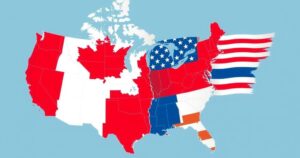Understanding the Political Exhaustion Among Americans
- Many Americans report tuning out or limiting their political news consumption.
- Recent studies indicate that 66% of Americans feel exhausted by politics.
- Fear has been used as a tool by politicians to maintain engagement.
- Information bubbles create a disconnect between opposing political sides.
- Political beliefs have become closely linked to personal identity.
Understanding Why Many Americans Are Tuning Out Politics
Political Exhaustion: A Widespread Sentiment Among Americans. As the 2024 U.S. presidential election approaches, many Americans are expressing fatigue and burnout with politics. A psychiatrist recently noted that a substantial number of her patients are opting to avoid political news altogether, often limiting their exposure to just a brief read or a single hour of political television. This represents a significant shift seen recently in political news consumption habits, reflecting a growing unwillingness to engage with the divisive nature of contemporary politics.
Political Fear Fuels Division Among Voters
The Rise of Fear as a Political Tool. In her recent publication, titled ‘AFRAID: Understanding the Purpose of Fear, and Harnessing the Power of Anxiety’, the psychiatrist outlines how fear has become an integral part of the political landscape. She’s highlighted how both politicians and media outlets utilize fear to grab attention, perpetuating an atmosphere of tribalism and adversarial thinking. This fear often manifests in extreme ways, creating a culture where Americans often find themselves divided along tribal lines, viewing one another with suspicion and, increasingly, hostility.
Information Bubbles Shape Divergent Political Beliefs
The Impact of Information Bubbles on Political Opinions. Many citizens today find themselves entrenched within information bubbles, with their social media feeds heavily catered to their existing beliefs. This creates a skewed perception of the opposing side, often painting them in a light that exaggerates negative traits while ignoring the common ground. As a result, many Americans have come to view their political identities as intrinsic to their moral standing, making it nearly impossible to engage in civil discussions with those who possess differing viewpoints. Poll results show a considerable portion of both Republicans and Democrats deem members of the opposing party as less moral, demonstrating just how far political discourse has deteriorated.
In summary, political exhaustion among Americans is a multifaceted issue, driven by fear, information bubbles, and the intertwining of identity with political beliefs. As fear continues to dominate the discourse around U.S. politics, many individuals feel overwhelmed and disengaged. The underlying psychological mechanisms like learned helplessness highlight the need for a profound re-evaluation of political engagement approaches, suggesting that it’s perfectly acceptable to take a step back from the noise.




